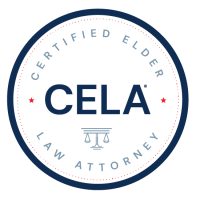
Consultation Today
- Tel: 561-686-6200
- Fax: 561-686-0303


If you are caring for an elder adult or a person with special needs, or if you yourself are a senior or person with special needs, getting quality legal support from an attorney you can trust is probably at the top of your list as you navigate the multitude of vital legal issues you find yourself dealing with. When you are looking for the best lawyer you can find, you may ask friends and family for “word-of-mouth” referrals and also look for reviews and testimonials on the lawyer’s website or various online searches. If you find an attorney who is “certified” by one group or another, you might wonder what that means. Certification is typically a high level of distinction reserved for only the top attorneys who work hard to attain that level of recognition, but, of course, it all depends on what organization is doing the certifying. Today we look at the National Elder Law Foundation and what it means to be a Certified Elder Law Attorney. For help with elder law or legal support for children or adults with special needs in Florida, contact Shalloway & Shalloway, P.A., to visit with a certified West Palm Beach elder law attorney.
The National Elder Law Foundation (NELF) is a non-profit organization dedicated to developing and improving the professional competence of elder law attorneys, defined as the legal practice of counseling and representing older persons, persons with special needs, and their representatives. NELF works toward this goal by providing continuing education and resources to elder law attorneys and through the process of elder law certification. NELF awards qualified attorneys with the distinction of Certified Elder Law Attorney (CELA)®. CELA certification is granted to attorneys who have achieved the highest level of excellence in their profession and is recognized as the gold standard among elder law and special needs attorneys.
CELA certification is highly exclusive. There are currently just over 500 CELAS nationwide, although the number continues to grow each year as more elder law attorneys recognize the significance of CELA certification and strive to achieve this status. Mark Shalloway holds CELA certification and belongs to the first class of NELF-certified attorneys.
The rules and regulations for becoming certified are extensive. A brief summary of qualifications can be found outlined below:
The applicant must be licensed to practice law in the United States. They must have practiced law during the five years preceding their application and must be currently actively practicing law. The applicant must be a member in good standing of every state bar where they are licensed.
The applicant must demonstrate substantial involvement in elder law, defined as spending an average of at least 16 hours per week practicing elder law in the three years before applying for certification. Additionally, the applicant must have handled at least 60 elder law matters during that time across a dozen different areas, including health and personal care planning, estate planning, legal capacity counseling, public benefits (Medicaid) advice, special needs counseling and more.
Applicants must have taken at least 45 hours of continuing legal education in elder law within the previous three years.
The applicant must provide at least five references from attorneys who are familiar with the applicant’s qualifications and competence in the field of elder law. The lawyers serving as references must themselves meet certain criteria as experienced elder law practitioners and cannot be members of the applicant’s family or work in the same law firm. These attorneys participate in a confidential peer review to guard the integrity of the process.
The applicant must pass a written examination of competence in elder law by demonstrating special knowledge, skills and proficiency in elder law, ethical rules specific to elder law attorneys, special knowledge of the aging process, and familiarity with the aging network and resources that clients will likely need to access.
Certified attorneys must also apply for re-certification every five years by demonstrating their compliance with the rules and regulations regarding good standing, substantial involvement in the field, continuing legal education, and peer review.
As you browse attorney websites, you are likely to come across a lot of different awards and recognitions being touted, and you might start to wonder if all of these awards carry the same weight or are really as prestigious as they are made out to be. It is indeed a good idea to evaluate these awards critically and judge each one on its own merits. CELA status is administered by the National Elder Law Foundation, which is accredited by the American Bar Association (ABA) to grant that certification. In fact, NELF is the only national organization accredited by the ABA to certify practitioners of elder and special needs law. While there are other credentialing organizations out there, and several of them are eminently respectable, CELA certification is one you know you can trust based on NELA’s exclusive status with the ABA as authorized to grant this distinction.
Board certification typically refers to certification as a specialist by the state bar where the attorney practices, although there are some national boards as well, depending on the field of law. The Florida Bar recognizes several areas of specialization, including Elder Law. The Florida Bar Board Certification is a rigorous process akin to CELA Certification, with requirements including several years of practice in elder law, continuing legal education, peer recommendations, and passage of a written examination.